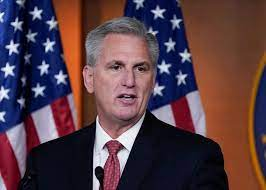Introduction to kevin mccarthy net worth
When it comes to the world of politics, few names resonate as strongly as Kevin McCarthy. As a prominent figure in the Republican Party and Speaker of the House, his influence stretches far beyond his political duties. But what about his personal wealth? Unpacking Kevin McCarthy’s net worth offers a fascinating glimpse into not just his financial landscape but also how that wealth intertwines with his career in politics.
Many wonder how much money he has amassed and what factors have contributed to this growth. From real estate investments to strategic political maneuvering, there’s more than meets the eye. Join us as we dive deep into McCarthy’s financial journey while exploring controversies, comparisons with other political figures, and what lies ahead for him financially in this ever-evolving landscape. Buckle up—it’s going to be an enlightening ride!
Overview of kevin mccarthy net worth
Kevin McCarthy’s net worth is a topic that draws significant attention. As of 2023, estimates place his wealth in the range of $300,000 to $500,000. This figure may seem modest compared to other prominent political figures.
His financial landscape consists largely of real estate investments and government salary contributions. His career in politics has spanned over two decades, providing him with opportunities for earnings beyond his congressional role.
Additionally, McCarthy’s networking abilities have likely opened doors for lucrative speaking engagements and consultancy roles post-politics. These factors contribute subtly yet significantly to the perception of his financial standing within the political arena.
The complexities surrounding his assets reflect broader themes about wealth accumulation among elected officials in America today.
Factors contributing to the growth of McCarthy’s wealth
Kevin McCarthy’s wealth has seen a notable increase over the years, driven by several key factors.
First, his long-standing career in politics offers substantial financial benefits. Holding various leadership positions within Congress often comes with lucrative salaries and bonuses.
Real estate investments also play a significant role. McCarthy has strategically invested in properties that have appreciated over time, adding to his overall net worth.
Additionally, fundraising efforts cannot be overlooked. As a prominent Republican figure, he has garnered considerable support from donors and special interest groups eager to invest in his political endeavors.
The rise of social media further amplifies these dynamics. By leveraging platforms for outreach and engagement, McCarthy can effectively connect with constituents while expanding his brand visibility—and ultimately enhancing monetization opportunities.
Controversies surrounding McCarthy’s finances
Kevin McCarthy’s financial landscape is not without its controversies. Critics have raised eyebrows over his real estate investments, particularly the timing and nature of some transactions. Questions about potential conflicts of interest often surface, especially given his influential role in Congress.
Moreover, scrutiny has followed campaign contributions linked to certain lobbyists and corporations. Detractors argue that these relationships may compromise his integrity as a public servant.
In addition, there have been allegations regarding undisclosed income sources during key election years. Such claims fuel speculation about transparency in political finances.
This backdrop adds complexity to McCarthy’s narrative as a politician navigating both power and wealth amidst increasing public scrutiny. The blending of personal interests with political responsibilities remains a contentious topic among voters and analysts alike.
Comparison to other political figures’ net worths
When examining Kevin McCarthy’s net worth, it’s intriguing to compare it with other prominent political figures. For instance, Nancy Pelosi boasts a net worth that far exceeds McCarthy’s. Her investments in real estate and stock market holdings have propelled her financial status significantly.
On the Republican side, Mitch McConnell presents another interesting comparison. His wealth is also substantial but focuses more on long-term investments rather than quick gains from property ventures.
Notably, AOC (Alexandria Ocasio-Cortez) offers a stark contrast. While she has gained fame for her progressive policies, her net worth remains considerably lower due to her relatively recent entry into politics and modest lifestyle choices.
These comparisons highlight the diverse ways politicians accumulate wealth and navigate their financial landscapes while still being engaged in public service roles. Each figure reflects unique strategies influenced by personal values and career trajectories.
Impact of McCarthy’s wealth on his political career
Kevin McCarthy’s financial standing has undeniably shaped his political trajectory. His wealth affords him access to exclusive networks and influential donors, enhancing his visibility within the Republican Party.
Having substantial resources allows him to fund campaigns aggressively. This financial backing attracts endorsements and increases his competitiveness in elections. It also ensures he can respond swiftly to challenges from both opponents and primary rivals.
Moreover, McCarthy’s affluence gives him leverage in negotiations with other lawmakers. Financial independence can create a sense of autonomy that often resonates well with constituents seeking strong leadership.
However, this wealth can be a double-edged sword. Scrutiny over personal finances may lead some voters to question his motives or priorities, potentially alienating segments of the electorate who value authenticity over affluence.
How he navigates these dynamics will undoubtedly influence future initiatives and legislative endeavors as he seeks to maintain support among diverse voter bases.
Speculation on future kevin mccarthy net worth
As Kevin McCarthy continues to navigate the political landscape, speculation about his future net worth is rampant. His position as Speaker of the House certainly adds a layer of financial opportunity. With increased visibility comes potential for lucrative book deals or speaking engagements.
Investors and analysts are closely watching his moves within Congress. Policies that align with business interests could lead to partnerships and endorsements, further bolstering his wealth.
However, political volatility can have unpredictable effects on financial status. A shift in party control might impact fundraising efforts or lobbying opportunities associated with his role.
Additionally, public perception plays a crucial part in shaping career trajectories. How McCarthy manages controversies around finances will undoubtedly influence future earnings potential—whether through public trust or backlash from critics who question transparency matters makes all the difference here.
Conclusion: The intersection of politics and personal wealth in America
The relationship between politics and personal wealth in America is a complex one. For many politicians, like Kevin McCarthy, financial success can enhance their political influence. Wealth provides access to networks that might not be available otherwise, along with the means to run effective campaigns.
McCarthy’s financial journey reflects broader trends in American politics. It illustrates how individuals navigate their careers amid public scrutiny while managing personal finances. His growing net worth raises questions about accountability and transparency among elected officials.
As we observe McCarthy’s trajectory, it becomes clear that personal wealth plays an undeniable role in shaping political landscapes. This intersection often leads to debates over privilege versus representation—the age-old question of whether affluent politicians truly understand the needs of everyday Americans.
In this context, understanding Kevin McCarthy’s net worth offers insights into how money influences power dynamics within the political arena. The ongoing dialogue about wealth in politics will likely continue as society grapples with the implications for democracy and governance moving forward.




